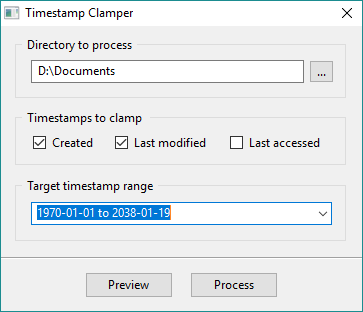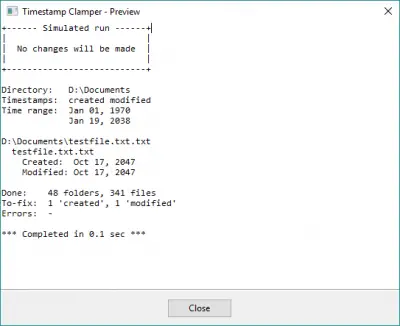Timestamps or simply Date-Time Object is used to store dates and time on our computers. Different file systems have a different range of these timestamps. Any file that has a timestamp that is too old or a timestamp that is very far away in the future can cause a problem in that file system. Sometimes, there can also be compatibility issues with two different file systems.
Suppose you are copying an old file from one hardware to another. The source hardware can handle that old file, but the destination hardware is not. So, what you need to do now is normalize the timestamp so that both filesystems can read it. And this can be easily done using this small portable tool called Timestamp Clamper.
Reset file and folder timestamps with Timestamp Clamper

The tool is very basic and simple to use. It involves minimal configuration and steps. Also, it comes preloaded with configurations corresponding to different file systems so that you do not have to manually enter the timestamp range.
To get started, click on the ‘…’ button and select a directory which you want to be processed. Now choose the timestamps which should be clamped, they can be:
- Created: This stores the data and time when the file was initially created.
- Last Modified: This keeps a record of the date and time when the file was last edited and saved.
- Last Accessed: This stores the date and time when the file was last read.
Reset timestamps
You can choose just one of them or select multiple. Now in the last step, you need to choose ‘Target Timestamp Range’. As I mentioned, you do not need to enter the range. Just select the target file system from the drop-down. The options available are:
- FAT32
- exFAT
- NTFS
- Ex2
- Ex3
- Ex4
- Unix Time
Now you are almost ready to start processing the files. But before you do that, there is also an option to run a simulation and check what changes will be made after the processing has completed. You can run this simulation by hitting the ‘Preview’ button. The simulation comes handy when you are not sure about the files inside the directory and just want to have a look if they need to be changed or not.

Just for reference, on my computer, I went ahead in time (the year 2047) and created a text file and came back to 2017. Now when I scanned that directory with target system as Unix Time (range is 2038), the file was reported and processed. The time was clamped and modified to value within the range of that file system.
Timestamp Clamper is a simple and easy tool. It doesn’t require much configuration or settings. All you need to do is load up your files and start changing their timestamps. Remember that once the timestamps are modified you cannot change them back to their original values. So if you want to preserve the original timestamp on your file system, it is recommended to take a backup of those files.
Click here to download Timestamp Clamper.
What is timestamp of a file in Windows?
There are three things that denote the timestamp of a file or folder in Windows PC – Date Created, Date Modified, and Date Accessed. The first one says when you created a file. The second one denotes when you modified a file. The last one denotes when you accessed a file. All these things are parts of the timestamp.
Can you change the timestamp of a file?
Yes, you can change the timestamp of a file in Windows 11/10. For that, you need a third-party program called Timestamp Clamper. Timestamp Clamper is compatible with Windows 11 as well as Windows 10. It allows users to change all those three things mentioned above.
That’s all! Hope it helped.